Journalism and Ideals
August 8, 2018
Related:
Journalism and Ideals of Democracy
These are interesting times for journalists in America. We reached out to nine of them, all with degrees from Maxwell. With their public affairs education, they understand as well as any journalists what the vigor of the press means to us all.
By Jeffrey Pepper Rodgers
Special Series: The Fourth Estate
>>Shared Goals and Higher Callings
>>A Different Path to Journalism
>>Journalism and Ideals of Democracy
During the lead-up to the 2016 presidential election, investigative political reporter Michael Kranish and his Washington Post colleague Marc Fisher co-wrote an in-depth biography of then-candidate Donald Trump. Titled Trump Revealed, the book drew on exhaustive original research by a team of Post reporters, including some 25 hours of interviews with Trump himself, and meticulously laid out its sources in over 1,000 endnotes.

“The effort was to provide the fullest, fairest accounting of Trump’s life, which to my view is very important to understand in anybody’s background,” says Kranish, also the co-author of Boston Globe biographies of Mitt Romney and John Kerry. “What have they done to prepare themselves for this extraordinary job?”
Trump himself responded to the book before it was published. “The @WashingtonPost quickly put together a hit job book on me- comprised of copies of some of their inaccurate stories,” he tweeted. “Don’t buy, boring!” Afterward, though, Trump never cited any specific errors in the book, and no corrections were needed in its post-election paperback edition.
Charges about “fake news” reporting have been a familiar refrain during the candidacy and presidency of Donald Trump — from accusing the major news outlets of having a “sick and biased AGENDA” to calling them “the enemy of the American People.” Allegations against the free press are certainly nothing new. Presidents and politicians of all stripes throughout the country’s history have questioned the accuracy or fairness of news reports. But Trump’s questioning of the credibility of the press has been especially aggressive and relentless — and very public, thanks to social media.
Trump’s attacks echo and amplify views shared by a significant portion of the public. The recent Gallup/Knight Foundation Survey on Trust, Media, and Democracy, for instance, found that two-thirds of Americans see most news media as doing a poor job of separating fact from opinion, and a majority feel that the proliferation of news and information sources has actually made it harder to stay informed. Yet more than 80 percent believe the news media is critical for reporting on public affairs and holding leaders accountable.
Rarely have so many people discussed (and often worried about) the future of the American free press. How should the media respond to charges of fake news? How can journalists rebuild trust with a skeptical public bombarded with conflicting representations of the truth? And, ultimately, how best can the press serve its vital role in the democracy?
We reached out to alumni of the Maxwell School who are prominent journalists, and asked them to reflect on these questions. They are well positioned to do so. At Syracuse University, many future journalists combine a Maxwell degree in public affairs or the social sciences with a degree from SU’s S.I. Newhouse School of Public Communications. Michael Kranish, for instance, majored in political science and newspaper journalism.
The Maxwell/Newhouse educational combination makes sense, since along with communication skills journalists need to understand their role in public affairs. Plus, studying such subjects as politics, policy, and economics provides invaluable background for reporting on civic issues. In the words of NPR newscaster Lakshmi Singh, who majored in broadcast journalism and, at Maxwell, Latin American studies, “My journalism skills are the tools for the storytelling. A social science background provides the colors, curves, and depths of context necessary in accurately relaying a story.”
"My journalism skills are the tools for the storytelling. A social science background provides the colors, curves, and depths of context necessary in accurately relaying a story."
Dean David Van Slyke
According to Syracuse University records, close to 150 working journalists have Maxwell degrees. We reached out to nine of them, working across the media landscape. All spoke passionately about the importance and challenges of serving the public good.
Serving the Republic
Though these journalists do not work for the government, many view their job as a form of public service. Kranish, who in addition to his political reporting has written a book on Thomas Jefferson during the Revolutionary War, sees the press in its historical context.
“Jefferson famously said if the choice was to have newspapers without government or government without newspapers, he would prefer to have newspapers without government,” says Kranish. “Before the revolution, he was quite willing to use the press to foment revolution. When he was president, he was not very happy with some of the articles that were written about him, but nonetheless he still believed strongly in a free press. It’s part of our Constitution, it’s the First Amendment, and it’s essential to this democracy.”
One of the core functions of the free press is informing the public about those they elect: shedding light on the workings of government and political campaigns, following the money and tracing its influence, and holding politicians accountable for their words and actions. “If we don’t have a free press,” Kranish concludes, “then you could argue we don’t really have the democracy that was intended.”
“If somebody says one thing and does another, that’s very fair game for us,” says Dave Levinthal, who leads a team of investigative reporters covering federal politics at the nonprofit Center for Public Integrity. “That may be President Trump, or that may be President Obama. We don’t pay attention to whether you have a D or an R after your name. We pay attention to what you say and then what you do.”
Performing that watchdog role requires a clear understanding of the structure and functions of government. Without that knowledge, asks Guy Campanile, a producer for CBS News’s 60 Minutes, how can the press protect and serve a democracy? “I don’t see how the two things can be independent,” he says. “I don’t care if you’re working for the Boston Globe or TMZ. You’ve got to have a sense of what the principles of the republic are if you have any intention of informing your fellow citizens. Otherwise, you’re just a cynic.”
A Maxwell education provides specific topical background that any reporter might need. For Seema Mehta, who reports on elections for the Los Angeles Times, a degree in policy studies gave a her leg up in analyzing and clarifying candidates’ policy proposals. Jeff Glor, anchor of the CBS Evening News, studied economics at Maxwell and won an Emmy for business and economic reporting for a story on efforts to revive a Rust Belt town in western Pennsylvania. In his current post at the Evening News, he says, “We report on the markets pretty much every night. We’re talking about jobs reports. A Congressional Budget Office estimate came out yesterday talking about projected deficits. My background at SU and at Maxwell informs all of that.”
Beyond this kind of specialized knowledge, several of the journalists credit their Maxwell educations for illuminating the broad principles of democracy and the free press, and for fostering the kind of critical thinking necessary for journalism.
"I don’t care if you’re working for the Boston Globe or TMZ. You’ve got to have a sense of what the principles of the republic are."
For Levinthal, studying political philosophy at Maxwell “taught me how to think critically about pathways of power, and how individuals or corporations or other types of special interests use leverage and money to get what they want from a government.”
Campanile credits his political science classes for requiring him “not just to find the answer but to have an argument that supported my answer. I can’t think of a better foundation for journalism or citizenship than that.”
Keeping It Real
While the press’s fundamental role in public affairs remains the same, carrying out that job has no doubt become more challenging in today’s fragmented and fractious media environment. Long gone are the days when three networks commanded the airwaves and Walter Cronkite was characterized as the most trusted man in America. “There was a time in our history where journalists were viewed as unbiased referees, arbiters of truth,” says Mehta. “Because of polarization, there’s a large segment of society that’s skeptical of what we do.”
So how should the press address that skepticism, and also respond when its accuracy and honesty is questioned? Several of the journalists stressed the importance of not letting these controversies distract or divert them from their core purpose of informing the public. “For many of us, it’s not a job. It’s a calling,” says Singh. “It’s a responsibility. When we stop asking questions, we let down everyone who depends on us to be their eyes and ears.”
What the press needs to do now more than ever, says Campanile, is focus on the fundamentals — by being thorough in their reporting, asking pointed questions, and using primary sources. He cites the example of the 60 Minutes interview with Stormy Daniels, produced by his colleague Andy Court, that aired in March. Rather than rushing this highly anticipated story onto the air, 60 Minutes took time to make sure Daniels had evidence supporting what she said. The pressures of today’s round-the-clock news stream, Campanile adds, can undermine this kind of careful reporting. “When you’re always chasing breaking news and that big chyron, there is no time to separate opinions from factual events. It’s so dangerous, and I don’t think our industry is talking about it enough.”
To fully serve the public, reporters not only need to make sure that their work is, as Kranish puts it, “bulletproof,” but after their stories are published they need to hold themselves accountable for errors and omissions. In fact, rather than referring to news organizations like the Post as the mainstream media, Kranish prefers the term accountable media. If a reader points out an error, the paper will run a correction; or, if there is a missed perspective, they might consider a follow-up story. “Our currency is our credibility,” he says.
Part of being accountable, too, is addressing any biases in reporting. Pam Fessler, a national correspondent for NPR, notes that the media has blind spots and needs to do a better job of bringing diversity into newsrooms — not just ethnic diversity but diversity in socioeconomic backgrounds, so the public gets a full-spectrum view of current issues. The press, she says, should not comprise only those who “grew up and were educated in East Coast or West Coast cities, fairly upper middle class. I think we all, as journalists — especially the mainstream media — have to constantly be vigilant to make sure that we are covering the entire country.”
The Information Flood
Gaining the trust of the public can be particularly difficult in an era when so many news outlets are vying for attention and clicks. Kranish recalls how, when he was at SU in the 1970s, his professors discussed the issue that a handful of media institutions (the TV networks, radio, the major newspapers) controlled the flow of information to the public — and potentially missed or suppressed important stories. “Now we have the opposite situation,” he says. “There is such a bounty of sources. The floodgates have completely opened.”
Within that flood is all kinds of information — factual and authoritative as well as partisan, misleading, or entirely invented — that can spread at blinding speed via social media. At a glance, the work of a blogger relying on hearsay or a hacker doctoring an image to portray an event that never happened can appear to be as credible as a carefully researched, fully vetted report. For citizens trying to stay informed, it’s no easy task to separate out fact from fiction, news from opinion.
“The greatest challenge to our democracy right now is this flood of lies that are coming from every direction,” says Campanile. “When I say ‘lies,’ I don’t mean reports that people disagree with because of their political point of view. I mean stuff fabricated from whole cloth. That’s the threat.”
In this environment, unsubstantiated stories and conspiracy theories can continue to circulate online long after they are disproved or debunked. Fessler cited the example of Trump’s claim that three to five million people voted illegally in the last presidential election. “There is just no evidence that ever happened,” Fessler says. “So I can report that many, many times, backing it up, talking to experts, as much as I want. My question now is, if I reported something like that 10 years ago, how many people believed me? And what percentage of readers or listeners believe me today? People can just go where they want to find out information that reaffirms what they think is the case already.”
Recent revelations about the spread of deliberately fake and politically divisive news via Facebook and other social platforms have been a wake-up call for tech companies, citizens, and government alike about assessing the credibility of news sources. Scott Brodeur, who directs social-media strategy for a group of regional news organizations through Advance Local, sees evidence that the public is becoming more careful about where their news comes from.
“We know more readers are starting to seek out coverage from local news organizations that they trust,” Brodeur says. “We’re even seeing the big social platforms actively looking for ways to identify trusted news sources and to give those more prominence.”
In some communities, though, those local news outlets have been hit hard, and greatly diminished, by the changing economics of the news business, which now competes with such a glut of free content online. For the latest developments from the White House or Congress, the public can turn to many major newspapers and broadcast networks, Mehta points out. “But if you want to know about what happened in the school board, that’s only going to be covered by a very small number of people. What isn’t getting covered now that was covered 20 years ago?”
New Avenues for News
As much as today’s information overload creates challenges for conventional media, it offers opportunities for good reporting to reach well beyond printed newspapers and network TV programs.
Glor, who helped launch the 24/7 streaming news channel CBSN before taking the helm of the CBS Evening News, says the emergence of so many avenues for journalism is “hugely exciting for us — the fact that you can watch either CBSN or the Evening News on a TV, on a smartphone, on an iPad, on your laptop.”
The new media make available new tools for bringing stories to life, through video, live streams, virtual reality, and more, presumably enhancing the audience’s understanding of a topic or event. Ali Zaslav, who has produced short-form videos for the digital news outlet NowThis, says the online medium gives journalists the ability “to express a news story and package it in a way that’s extremely visual, giving all of the correct and factual information.”
"If you want to get news out to a younger audience, you have to go where they are."
This kind of visual storytelling can have an immense reach. One of Zaslav’s video reports for NowThis, about a man who spent nine years in prison for a crime he didn’t commit and then became a lawyer for others who are wrongfully convicted, has more than 23 million views on Facebook. Many of those viewers might not have encountered the story otherwise — particularly those who grew up with the internet and smartphones, who are accustomed to receiving information primarily through social media. “If you want to get news out to a younger audience,” says Zaslav, “you have to go where they are.”
Digital news and social media also facilitate direct communication between journalists and the public and can foster constructive conversations about important issues. Brodeur has been exploring that potential. This year, Advance Local partnered with Time to convene 21 people for two days of dialogue about guns. The project’s partners and facilitators worked to create an environment where people on all sides of the gun debate could comfortably and respectfully share their views. It has evolved into a closed Facebook group involving about 150 people, who are continuing a forum-like conversation on the topic.
“There’s a need to do more of that kind of conversation building in journalism and also in society in general,” says Brodeur. “Too often there’s rigid, opinion-based polarization on particular issues, which keeps people from listening to each other. We’re trying to elevate and move beyond that and have constructive conversations around difficult topics.”
Bursting the Bubble
As these conversations make clear, there is much that the press can and must do to preserve and strengthen their role in serving the democracy. But the public has a crucial task, too: to gain a broader view of what’s happening in the country by breaking the habit of relying on a single news source that confirms their pre-existing beliefs. “I’m a proponent of forcing ourselves to step out of that comfort zone,” says Singh, “so we get a fuller picture of what’s happening around us and a clearer understanding of how we are all affected.”
That means looking beyond narrow or partisan takes on current events, and adopting what Levinthal calls an “omnivorous news diet.”
“Going out and finding new sources of news so you have this robust understanding of the way that your government works is to your benefit,” he says. “You can get much of this information with incredible ease, in a way that would have been impossible even 15 or ten years ago. Everything is quite literally in your hand, and that’s a great deal of power. Don’t squander it.”
Jeff Glor
'97 BA (Econ/Broadcast Journalism)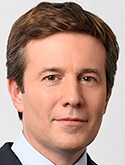
Anchor, CBS Nightly News
Jeff Glor’s path to becoming anchor of the CBS Evening News — where he carries on the tradition of such eminent journalists as Walter Cronkite and Dan Rather — began in Syracuse. Originally from the Buffalo suburb of Tonawanda, Glor came to Syracuse University for his undergraduate studies, and then stayed in the area for six more years to launch his career as a broadcast journalist, working at local station WSTM as a reporter and then anchor of the morning and evening newscasts.
“Syracuse was and always will be a special place to me — both Newhouse and Maxwell and the school as a whole,” says Glor. “A huge part of my life, a defining part of my life.”
Before taking the helm of the CBS Evening News in December 2017, Glor spent a decade as a correspondent for CBS. He covered major domestic breaking news such as the Sandy Hook school shootings and the Boston Marathon bombing, and reported internationally from Iraq, Haiti in the aftermath of the 2010 earthquake, and the Olympics in Beijing and Vancouver.
With so many news sources available today, Glor sees a daily digest like the CBS Evening News as offering an important service to the public. “To put in place something that is reliable, accurate, and fair, every evening, for a set amount of time,” he says, “I think there’s great value in that.”
Michael Kranish
'79 BA (PSC/Newspaper)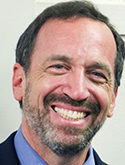
National political investigative reporter, Washington Post
Michael Kranish got a dramatic introduction to the world of investigative reporting as a high school student, when he came to Syracuse University’s Newhouse School to take summer journalism classes. It was 1974, the curriculum included the brand-new book All the President’s Men, and the day after the summer session ended President Nixon resigned.
Kranish spent more than 30 years as a correspondent for the Boston Globe before joining the Washington Post in 2016 as a political reporter. Though he often covers breaking news, he has a deep interest in history that has inspired projects such as his book Flight from Monticello: Thomas Jefferson at War.
“I do see journalism — as the cliché goes — as the first rough draft of history,” he says. “The more I’ve been a reporter, the more I think it’s important to understand how we got to where we are.”
Lakshmi Singh
'94 BA (LAS/Broadcast Journalism)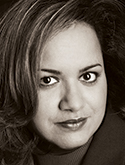
Newscaster, NPR
Lakshmi Singh is midday newcaster for NPR, delivering the breaking news segments that reach more listeners than any other public broadcast program. Before she focused on anchoring, Singh worked for 25 years as a field reporter, drawing on her degree in Latin American studies while covering topics such as immigration, HIV prevention in Haiti, and post-earthquake recovery in Central America.
Singh’s parents are Puerto Rican and Trinidadian, and she’s long been an advocate for diversity in the press. “The newsroom numbers do not reflect the demographic makeup of people of color in America,” and that fact affects how stories are selected and prioritized, she says. “It all goes back to the managers who make the calls on coverage. It matters who those managers are.”
Dave Levinthal
'02 BA (PPhil/Newspaper)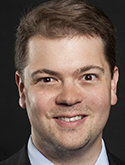
Senior political reporter, the Center for Public Integrity
Dave Levinthal became a political reporter straight out of the gate from Syracuse University, covering state and federal politics from New Hampshire to Texas to Washington, D.C. For the last five years he’s led a team of political reporters at the Center for Public Integrity, a D.C.-based nonprofit, nonpartisan investigative news organization.
Levinthal’s work goes beyond covering press conferences or what he calls the latest “turn of the screw” on Capitol Hill. “Sometimes we take a painfully long amount of time with the ultimate goal of revealing something about the workings of government that might otherwise be glossed over,” he says. “That’s what differentiates our organization from others that may not have the time or the mandate to follow a story to its ultimate conclusion.”
Guy Campanile
'90 BA (PPhil/Newspaper)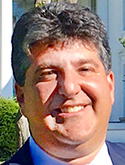
Senior political reporter, the Center for Public Integrity
Guy Campanile first got the idea of becoming a journalist as a seven-year-old in the Bronx, watching the CBS Saturday morning mini segments for kids titled In the News. Twenty years later, as a CBS producer himself, he was working with the creators of that very show. Campanile served as a producer of the CBS Evening News under both Katie Couric and Scott Pelley before joining the flagship newsmagazine 60 Minutes in 2014.
The behind-the-scenes job of a producer, he says, involves nearly every aspect of the segments that air on 60 Minutes. “I find the stories that you see on Sunday at 7 o’clock, I report them out, I typically write them, I work with the correspondent on the final product, and I’m the one responsible if it all goes wrong,” he says. “And if it all goes right, move onto the next one.”
Seema Mehta

Political writer, Los Angeles Times
Originally from the Philadelphia area, Seema Mehta has been reporting for the Los Angeles Times for 20 years. Named one of the nation’s top reporters on state politics by the Washington Post, Mehta has focused on elections for the last decade, covering the last three presidential races as well as numerous state contests.
In reporting on the political realm, she says, “You have one job to do. The press secretary has a different job to do. At times you aren’t going to get along, but it’s important for voters to know what the government is using our taxpayer dollars to do, what they’re doing in our name.”
Scott Brodeur
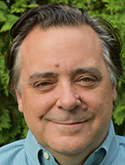
Senior director of social content strategy, Advance Local
Scott Brodeur got his first taste of the possibilities of online journalism in the early 1990s, when as a music critic he began conversing with readers on early internet bulletin boards. “Almost immediately I could see the power of the medium,” he says. “You could read stuff from journalists, but you could also have dynamic and passionate conversations around topics.”
Ever since, Brodeur has specialized in digital news and social media. At Advance Publications, he helped launch regional news websites starting in the late 1990s, and then laid the groundwork for the company’s digital-first newsrooms. Now at Advance Local, he focuses on social media strategies and online audience building for regional news sites around the country.
Pam Fessler
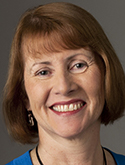
National correspondent, NPR
Pam Fessler made good use of her understanding of public administration, from a Maxwell MPA, during 13 years reporting on tax and budget issues for Congressional Quarterly. She became an NPR correspondent in 1993, and over the years since has covered such topics as homeland security, elections, Social Security, and, most recently, poverty and philanthropy.
Though not working for the government per se, Fessler considers journalism to be a crucial part of public service. “My job is to help inform the American public,” she says, “whether it’s the government or policy or just what’s happening around the country.”
Ali Zaslav
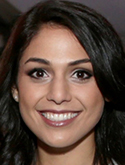
Supervising producer, NowThis
At the digital news outlet NowThis, Ali Zaslav has created short-form videos for social media on topics ranging from women’s issues and human-interest profiles to criminal justice. Zaslav, who worked for the Huffington Post, has produced hundreds of videos with more than 1.5 billion views on Facebook alone. Since last summer, her focus has been on developing content for Instagram stories. This fall, she is pausing her career to pursue a master’s in journalism.
The video form, Zaslav says, helps journalists present complex stories in an accessible, engaging way for people who get their news on social media. Short-form videos, she says, allow this broad audience “to take in a news story or a different point of view, or hear about an issue they never would have heard of.”
This article appeared in the spring 2018 print edition of Maxwell Perspective © Maxwell School of Syracuse University.